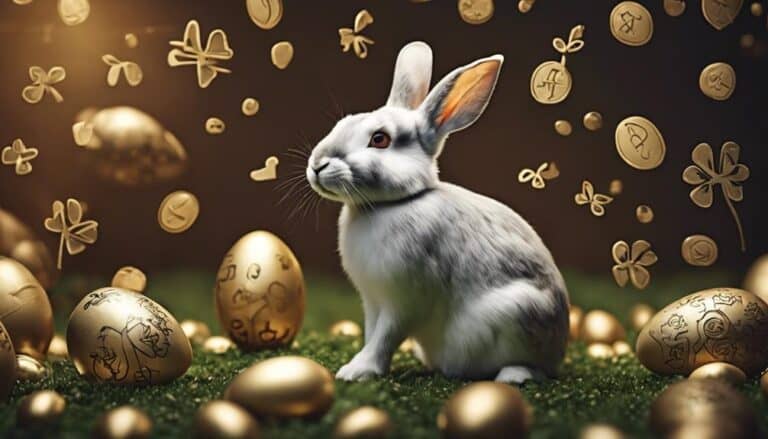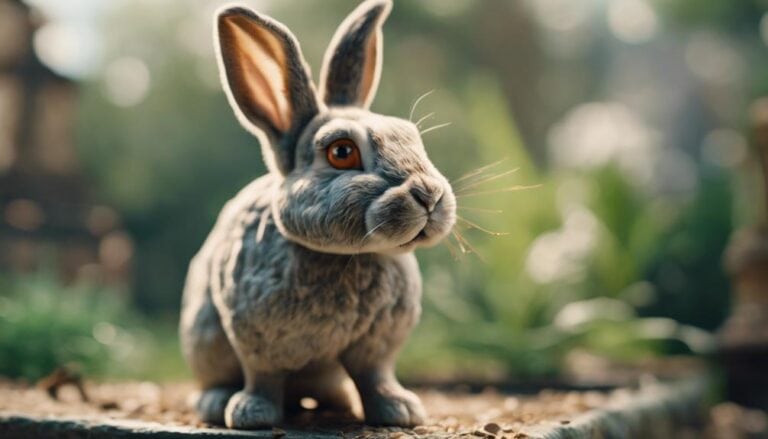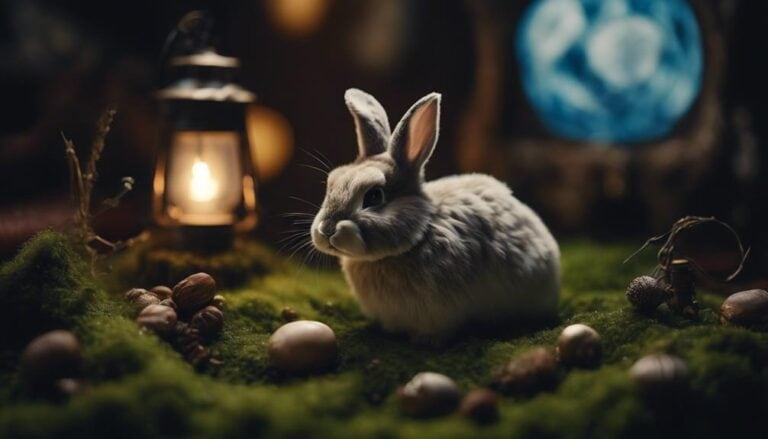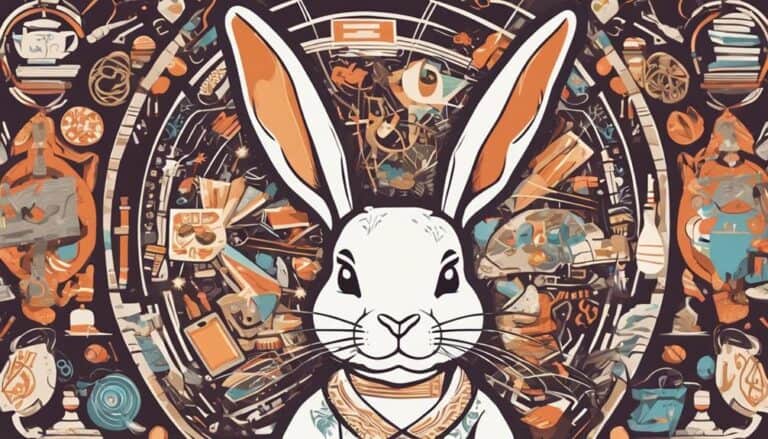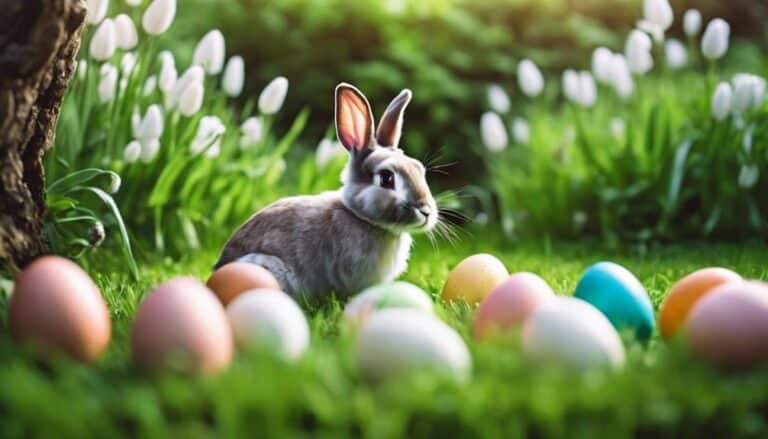Bunnies in Japan bear a cultural charm that captivates and carries centuries of significance. From ancient folklore to modern interpretations, these furry creatures have woven themselves into the fabric of Japanese society with a depth that surprises.
Curious about how these gentle beings have shaped traditions, art, and beliefs in the Land of the Rising Sun? Stay tuned to unravel the mystery behind the enduring allure of bunnies in Japan and their deeper meanings.
Contents
Key Takeaways
- Bunnies symbolize luck, cleverness, and advancement in Japanese art and folklore.
- Rabbits play a significant role in Japanese festivals like the Mid-Autumn Festival.
- The Year of the Rabbit in Japanese astrology signifies good fortune and harmonious relationships.
- Bunny characters have transitioned from traditional folklore to modern pop culture, reflecting Japan's cultural charm.
Bunny Symbolism in Japanese Art
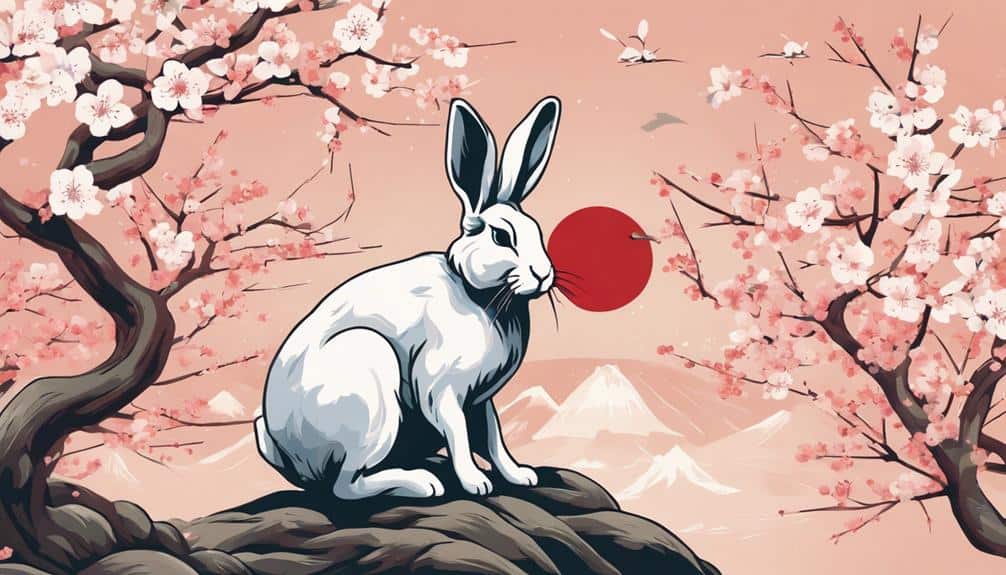
In Japanese art, bunnies hold a significant cultural symbolism, representing luck, cleverness, and advancement in various traditional motifs. These adorable creatures play an essential role in Japanese artistic expression, embodying positive attributes that resonate deeply within the culture. The intricate patterns found in traditional Japanese art, like the Nagoya-obi Hana Usagi designs, are inspired by historical treasures and showcase the enduring influence of rabbits in Japanese aesthetics.
Dating back to the 12-13th century, the Choujuu-Giga scrolls depict rabbits in lively and dynamic poses, illustrating their playful and clever nature. Even during the Nara period, rabbits were prominently featured in Shosoin patterns, particularly in the Hana Usagi design, underscoring their enduring cultural significance. Popular motifs such as Yukiwa-usagi, Nanten, and Mayumi continue to grace various art forms, highlighting the timeless appeal of rabbits in Japanese traditional art.
Through these artistic representations, bunnies in Japanese art serve as more than mere animals; they embody a deeper cultural narrative of luck, intelligence, and progress that continues to captivate audiences worldwide.
Bunnies in Japanese Folklore
Plunge into the rich tapestry of Japanese folklore, where bunnies emerge as celestial companions and embodiments of virtue and wisdom. In Japanese folklore, rabbits hold a special place, intertwined with myths and morals that have been passed down through generations.
Here are some key points to ponder:
- Moon Connection: Rabbits are often linked to the moon in Japanese folklore, symbolizing a deep connection to the celestial domain and the mysteries of the night sky.
- Kindness and Sacrifice: The tale of the 'Rabbit on the Moon' exemplifies themes of kindness and sacrifice, showcasing the selfless nature attributed to these gentle creatures.
- Luck and Prosperity: Rabbits in Japanese folklore aren't just symbols of kindness but also of luck and prosperity, embodying positive qualities that are highly valued in Japanese culture.
Through these narratives, rabbits in Japanese folklore serve as beacons of moral guidance, teaching lessons of selflessness, virtue, and the interconnectedness of all beings in the universe.
Bunnies in Japanese Festivals
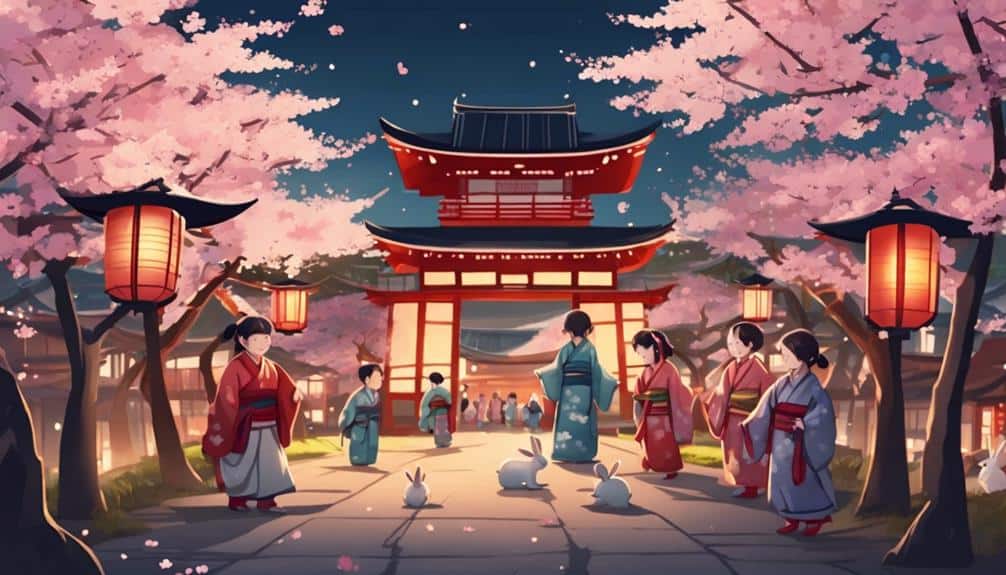
Embark on a journey through the vibrant tapestry of Japanese cultural celebrations, where bunnies take center stage in the Mid-Autumn Festival, symbolizing unity, good fortune, and the warding off of evil spirits. In Japan, the Mid-Autumn Festival is a time when homes are adorned with rabbit motifs and suzuki grass to invite good luck and prosperity. This festival holds deep cultural significance, as people gather under the brightest full moon of the year to enjoy traditional snacks like rice cakes and tsukimi dango. The rabbit motifs present in this festival represent blessings, happiness, and harmony among individuals.
Throughout the Mid-Autumn Festival in Japan, the emphasis on rabbit symbolism underscores the values of unity and positivity. Traditional customs during this festival include not only decorating homes with rabbit-themed items but also partaking in festive foods believed to bring luck and ward off malevolent spirits. The presence of bunnies in Japanese cultural celebrations like the Mid-Autumn Festival highlights the enduring connection between these adorable creatures and the country's rich heritage.
Bunnies in Japanese Astrology
Certainly, the role of bunnies in Japanese astrology reveals a fascinating connection between these beloved creatures and the cultural beliefs surrounding zodiac signs. In Japanese culture, the Year of the Rabbit holds significant importance as one of the 12 zodiac signs based on the Jupiter cycle. Individuals born under this sign are believed to embody positive qualities such as family values, prosperity, peace, and kindness.
The Year of the Rabbit is a favorable animal sign in Japanese astrology, symbolizing good fortune and harmonious relationships. People born in this year are thought to carry the attributes associated with the Rabbit, fostering a sense of unity, compassion, and tranquility within their lives and interactions.
This deep-rooted belief in the influence of zodiac signs on one's character and destiny highlights the intricate blend of tradition, spirituality, and cultural values within Japanese astrology.
Evolution of Bunny Characters in Japan
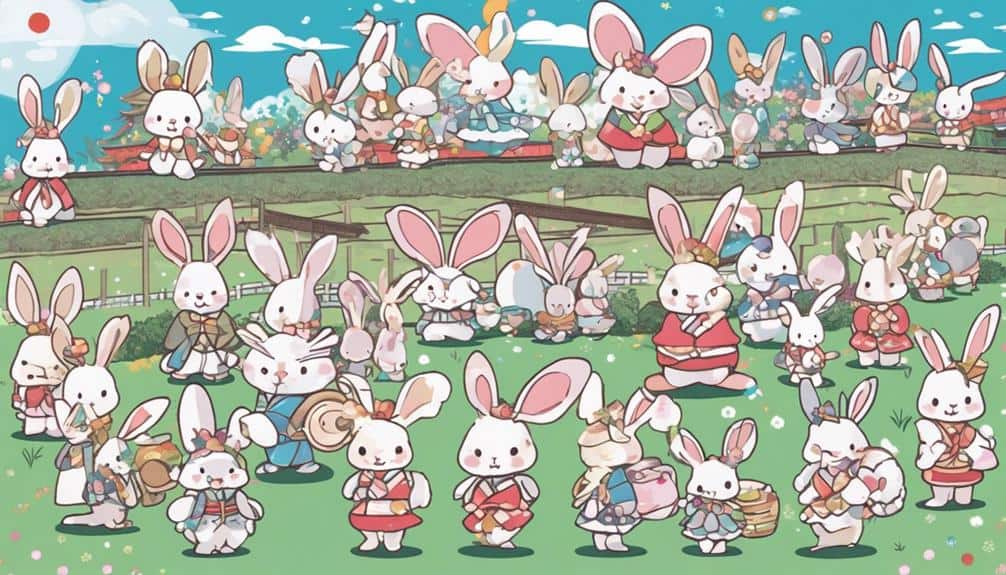
The development of bunny characters in Japan showcases a dynamic shift from traditional Japanese folklore to modern pop culture, illustrating a diverse range of traits and themes. From the ancient tale of the moon-viewing rabbit to contemporary anime icons like Usagi Tsukino from Sailor Moon, bunny characters have undergone a remarkable transformation. These characters not only entertain but also reflect the changing cultural landscape of Japan.
In Japanese pop culture, bunny characters have become synonymous with the kawaii culture, influencing various aspects of merchandise, fashion, and entertainment. The cute and endearing qualities of bunny characters like Chiyo Mihama from Azumanga Daioh resonate with audiences of all ages, embodying innocence, playfulness, and resilience. This development highlights how bunny characters have evolved from mere folklore figures to beloved symbols that contribute to the charm and appeal of Japanese media.
Through their development, bunny characters have captured the hearts of many, transcending traditional boundaries and becoming integral to the fabric of Japanese pop culture.
Frequently Asked Questions
What Does a Rabbit Symbolize in Japan?
In Japanese culture, rabbits symbolize luck, cleverness, and self-devotion. They are revered as mythical creatures embodying advancement and prosperity. Rabbits are cultural icons in Japan, embodying spiritual symbolism and are deeply rooted in animal folklore and folk beliefs.
What Is Special About Rabbits in Japan?
Cute companions, lucky charms, and symbols of spring, rabbits in Japan hold a special place in tea ceremonies, zodiac signs, traditional art, and anime characters. Their cultural significance spans centuries, embodying various positive traits.
What Is the Japanese Folklore About Rabbits?
In Japanese folklore tales, moon rabbits hold significance as lucky charms and sacred animals. They embody folk beliefs and symbolize virtues like selflessness and sacrifice. Mythological creatures, they are revered for their symbolic meanings.
What Is the Japanese Saying About Rabbits?
In Japanese proverbs, rabbits symbolize speed and agility, reflecting cultural beliefs in quick decision-making. They feature in folklore tales and artistic representations, embodying superstitions for good luck. Literary references often depict rabbits as clever and resourceful creatures.
Conclusion
As you reflect on the intricate tapestry of Japanese culture, you can't help but be captivated by the endearing and enduring presence of bunnies. These beloved creatures have hopped their way into the hearts of the Japanese people, symbolizing a blend of cleverness, luck, and prosperity.
Through art, folklore, festivals, and astrology, bunnies continue to charm and inspire, leaving a trail of good fortune and joy wherever they go. Embrace the bunny spirit and let it guide you towards a brighter future.

